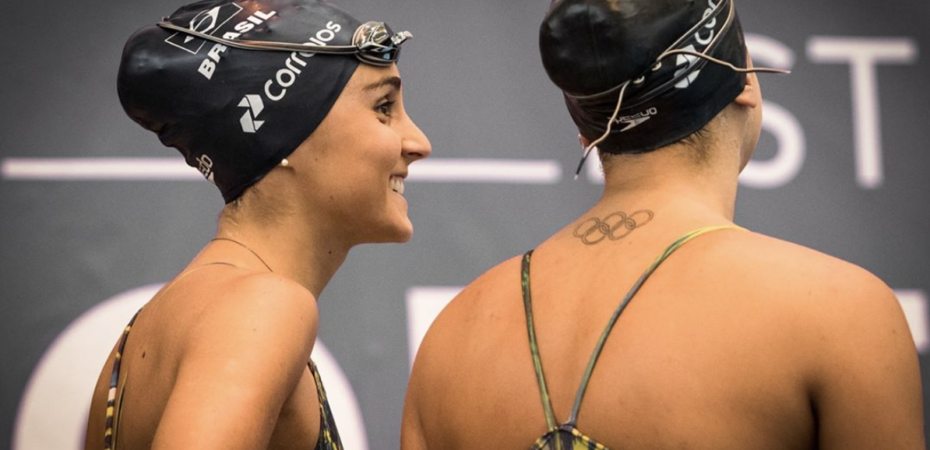While the COVID-19 pandemic is far from being over and some European countries are once again shutting down, the vast majority of elite artistic swimmers have been back to training for the last few months. With the Olympic Games in nine months and the Qualification Tournament in five, all eyes are set on Tokyo.
We caught up with national team athletes and coaches from Russia, Spain, Greece, Australia, Switzerland and Brazil to hear about their lockdown experiences, their returns to the pool in unprecedented times, and what have been some of challenges or restrictions they’ve had to adapt to.
- Alla Shishkina (Russia), two-time Olympic champion, qualified for the 2021 Olympic Games
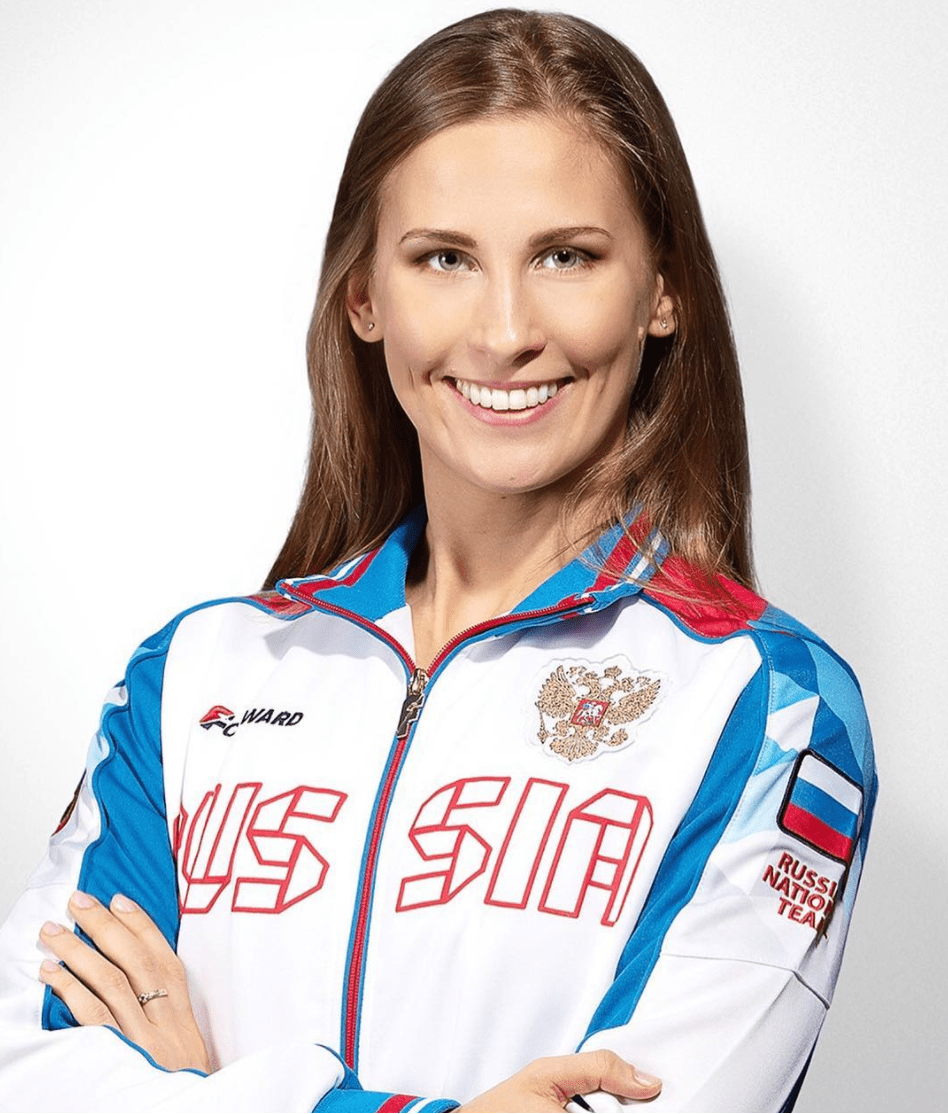
“We sat at home for two months, in April and May. At the beginning of June, our sports base [Lake Krugloye] reopened in ‘closed mode.’ You come in, and immediately get to a separate hotel in the red zone. The next day, you take the COVID-19 test and it’s ready in 24 hours. If the test is negative, you can go out into the green zone and start training. You’re at the base for 21 days, then you can go home for three days and return to the base again for 21 days.
After two months at home, it was hard to return. It felt like I hadn’t swam for a year. And it’s hard to sit locked up, of course. So, that’s how we lived and trained until August 19 when we started our vacation. That month of rest is normal for us, and we’re back in shape now. Since October 1, we have returned to the base again. It continues to operate behind closed doors, through tests. Staff all wear masks and special suits. Sanitizers and other protective equipment are placed everywhere. We have to take tests every time we come back to the base, and if the test has tested positive, you are sent home.
Another major change is that we can’t leave over the weekend. All contacts and transfers are prohibited. It’s very hard morally, especially for those who have husbands and children. We all very much hope for the opening of the base, but as long as the number of infected people is increasing, this is not possible. At least we can train normally now. There are no restrictions. When the base is checked and it is considered safe, it is really safe.”
-
Mayuko Fujiki (Spain), head coach of the senior national team since 2017, gearing up for the Olympic Qualification Tournament
“They were eight and half weeks out of the water. From day one, we did a lot, a lot, of online training, for basically six hours every day. Usually three hours in the morning and three hours in the afternoon. We did dry land and strength training, land drilling, FeetUp… We had to be creative to keep everything going.
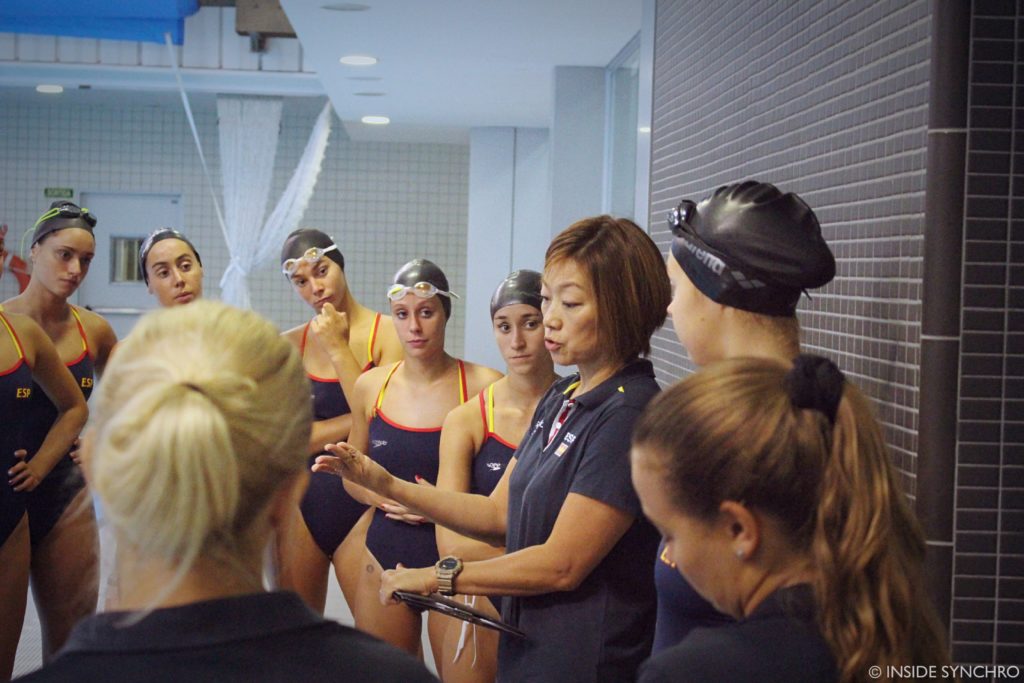
Besides training, I also wanted to make sure that we could enjoy this time, even though it was not ideal for athletes getting ready for the Olympics in any sense. It was all about how we could take advantage of all this time together in front of screens. It was also easier to catch people as pretty much everybody all over the world everybody was at home. So, every week, we had a guest in our online Zoom meeting, where we just focused on learning more about the Olympics.
One week for example we did the 1992 Olympics here in Barcelona. We researched it, watched together one part of the opening ceremony, and watched the last day of competition in marathon. We invited Yuko Arimori the silver medalist from Japan, and asked her about her experience. Another week we invited Janet Evans, a U.S. Olympic swimmer in 1988, 1992 and 1996 who has won four gold medals. She was 18 in ’88, so I thought that we could learn a lot from her, especially the younger swimmers like Iris [Tio] who are close in age to Janet when she went to her first Olympics. It was great, we learned a lot. She is also in the Olympic organizing committee for 2028, so we talked about the future as well.
Right after we came back from lockdown, we couldn’t train normally at all. First of all, we all couldn’t go back. All the girls from Catalonia could, but the girls from outside of Catalonia couldn’t travel back in. They had to stay in their homes a little bit longer than some of the other girls from here. It was also only just one coach at a time. We started with six girls, and the hours were limited. We could only go into the Centre d’Alt Rendiment (C.A.R.) once a day to go directly to the pool. It was strictly scheduled to not have a lot of athletes in the same place. We all had to be two meters away from each other, and couldn’t do any of the dry land stuff in the training rooms. So, it was just swimming at the beginning, and little by little it got better. Now we are training normally. When they came back to the pool, they were stronger. I was very much surprised, in a very good and positive way, after two months not being able to really swim.
As far as training plans, it was an unknown area. This is my first time, and obviously for a lot of coaches, to have two months of nothing in the water for the entire team, unless maybe your athletes were injured. At the beginning, I tried not to make a plan because I really had to discover how each would react after two months. It was kind of really analyzing each one of them first, and then little by little I made a plan and adjusted it. I didn’t want to focus on what we lost, or compare to how we were before lockdown, but I wanted to build up on what we did during our time out of the water.
One of the big challenges as a coach was to make sure that they were only focused on news coming from the International Olympic Committee (IOC), and not distracted by anything else. For example, the day of the postponement of the Olympics, we didn’t know much else or when the Olympics would actually happen. People would say it would be in winter of 2020, maybe in March 2021, in the summer of 2021, in 2022, or that it would be canceled in the end. Every time I heard it, it kind of hurt because getting ready, and being very tough mentally for the Olympics is already hard. As artistic swimmers, you have to go through these long hours of training, but if you have doubts about what you’re aiming for or that it might not happen, it’s even harder. I didn’t want athletes to listen to that kind of information and to have any doubts. You just go for it, even though it’s a difficult situation. Yes, you’re at home, but let’s give 100% in what we do, prepare for any moment, and not waste one day. I didn’t want them to have doubts because of all the different information that were not really coming from the important sources.
But really, there are so many positive things that came out from this experience. The first big one is their athlete mentality got way stronger. The little things don’t affect them anymore, and I feel very proud of them. The second thing is that as a whole team, I think we got closer, including all the staff members, athletes, and their families. With doing the Zoom training all day long, we saw each other, and mom and dad in the background. We could all talk, and the girls also got to see their teammates’ parents way more than usual. We even did some games and contests with the families, so we got to know each other more, not only as a team of athletes and coaches. Our circle got a little bit bigger, including families going through this together.”
-
Evangelia Platanioti (Greece), 2012 and 2016 Olympian, aiming for her third Olympics in Tokyo in the duet and team events
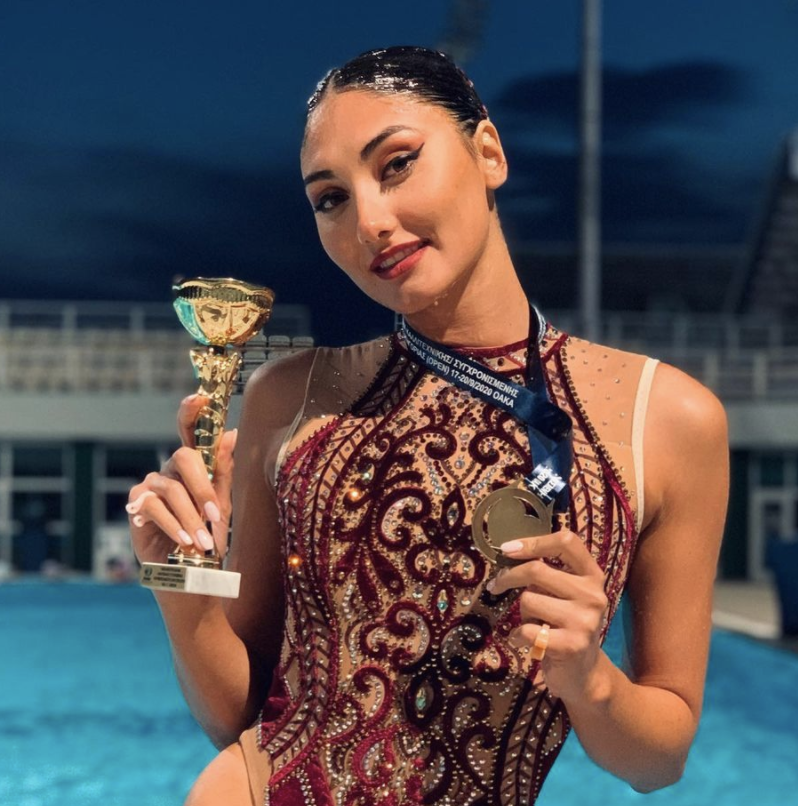
“We were almost two months without pool. Every day, we did trainings with Zoom, like gym, ballet, or yoga. It was a really strange feeling to be away from the pool, and to have so many weeks without seeing my teammates. Before the quarantine, we were together 13 hours a day, and suddenly nothing, zero hours. I really missed them. We had our Olympic dream, and that dream disappeared for this year. We were really excited to see each other again, and we want to start something new and fresh.
Every day now, we have to sign in with the time that we arrive at the pool, and the time we leave. We also fill out a survey, and say if we have symptoms, a fever, or if we feel bad. It is our new daily routine but it is easy for us, and that is what it is now. There is COVID so we have to be adjusting to that.
There aren’t any other big challenges, so we are lucky. We changed our main training place, and it’s very good. We are now at the Athens Olympic Aquatic Centre, and everything there is much better than at Agios Kosmas [Sports Center]. We are just now trying to find a gym that would only be for us, but with COVID it’s a little bit difficult.
Our federation organized all national championships for all ages in September and October. It was something really beautiful because of this difficult situation we went through. Of course our preparation, the conditions and the situation were not the best and we were not to the top level that we want to be for competitions. But it was something important for us, so we are happy that they happened.”
-
Amie Thompson (Australia), 2016 Olympian and qualified for the 2021 Olympics in duet and team
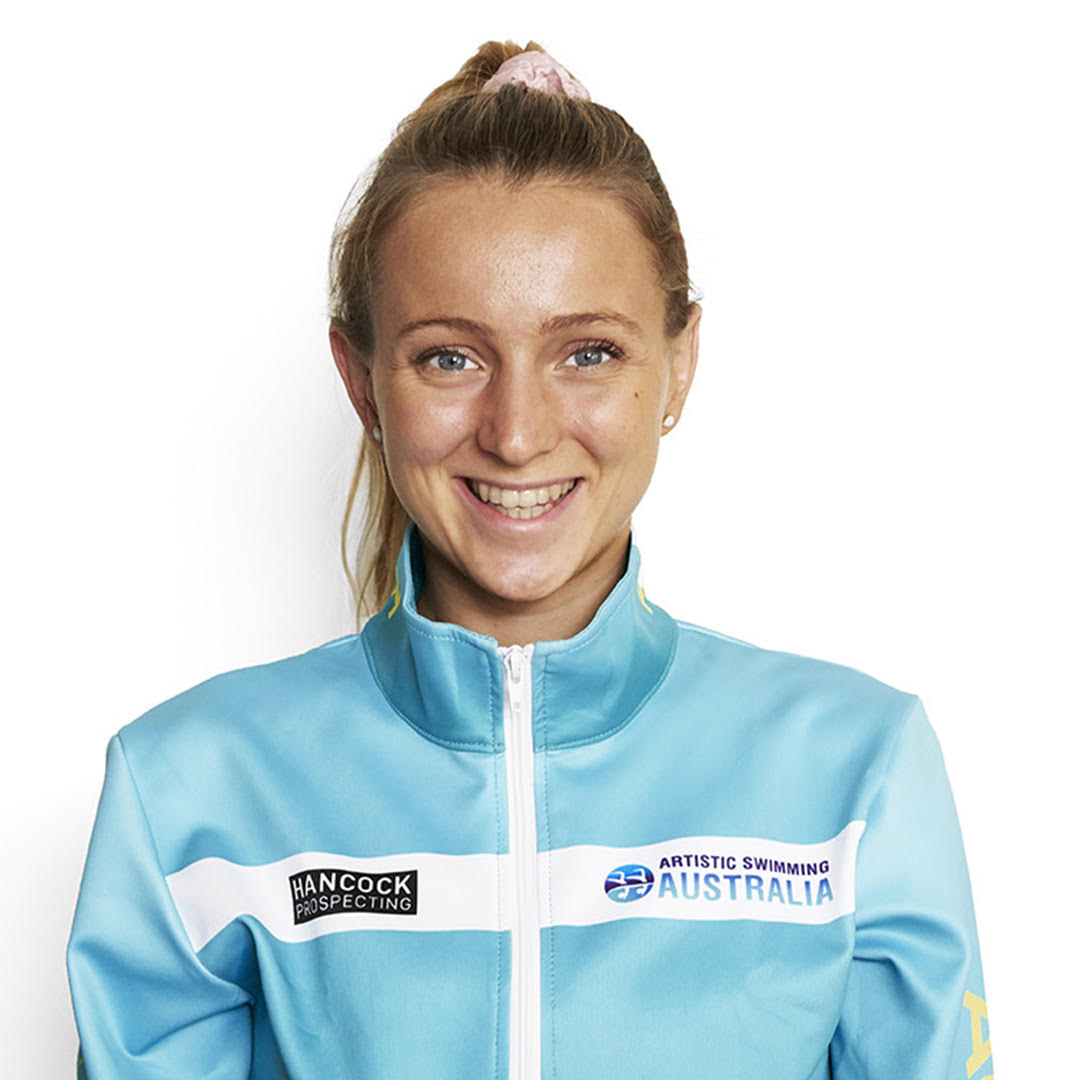
“We were out of the pool for about two and a half months. We returned in June. For a few weeks, we were only allowed in the gym for 45-minute sessions, and had to sanitize everything. We could not share equipment. In the pool, we had one and a half hour time frames, and had to be in a single lane each. Now we are back to normal.
The everyday protocol is now minimal. We just have to do a daily two-minute COVID-19 survey before coming to training, and we have to sign in. But other than that we don’t have to wear masks or anything. This is the same all over Perth.
However, our main challenge is that half the team is in Perth, and the other half in the Gold Coast. So, we haven’t been together since March because the state borders are still shut. We have just been doing individual work and no team work since then. Our choreographer is also in Melbourne, which has made making a new free team very difficult. Hopefully borders will open soon, and we will finally have a training camp in December.
I think a lot of us did struggle with loss of motivation. I personally realized that you don’t always have to be motivated, but you do always have to be committed if you want to achieve your goal. When we first started back in the pool, our coach was not here. She was out in the town where she lives, so we were training by ourselves. I made sure that I was at the pool every day doing the whole program. I used my phone to coach myself, or often sent videos to the coach. I did that for at least a couple of months.
I also got into a variety of other sports during this time. I was doing a lot of running, and I’ve done two half marathons since August. I’ve also started to learn to surf, and to swim in the ocean more. I did some pilates, and I got really into hot yoga. Those workouts in other sports actually ended up not only helping my synchro quite a bit, but also my mental happiness. I’ve been having the best time exploring other forms of fitness and exercise. It’s helped to find new communities too and to know that life goes on.
Things are getting back to normal. I’m still ready to go to the Olympics. Some days, I’m not as motivated as others, but I am committed.”
-
Joelle Peschl (Switzerland), Olympic hopeful in the duet event alongside Vivienne Koch
“We were in quarantine for two months without any water. We returned back to the pool mid-May. It was such a relief to see each other and our coach again. The trainings though were very strange. For example, you realize how the water sounds in your ear and how it is actually very loud, which you don’t realize when you have it everyday! The feeling of the water was also completely gone, so the first trainings in the water felt like swimming in cotton wool.
We have to wear masks at the entrance of the pool, and the national coaches have to take the temperature of the swimmers. We did adjust to that very quickly. We don’t really have any restrictions in the water and in the gym. We are very lucky to live near where we train during the week [at the Campus Sursee Sportarena in Oberkirch, Switzerland]. Since we concentrate more on the sport this year, we are pretty much focused and don’t have to deal with any restrictions at work or school. The only thing is we have to wear masks in the shops and public transportation.
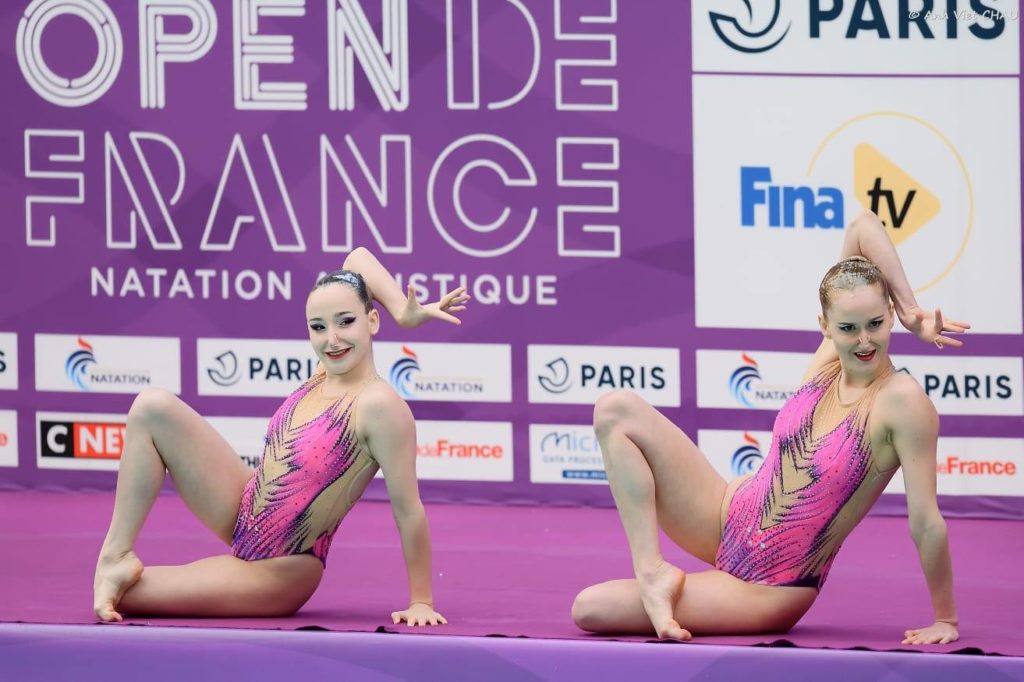
We actually see this situation as more like a chance to reach even higher goals. We recharged our batteries during the lockdown. We have a new coach Tania Rudkovskaya. She has so much experience and knowledge that brings us mentally as well as physically to a totally new level. That is exactly what we need in a year like this and with a goal like the Olympics. We both worked with her in the past, and she did train with us already before the lockdown for one or two weeks. So she already knew the routines, and we all adapted very fast.
With COVID-19 and the support of the government, our training facility and situation actually completely changed for the better. We now have better conditions than before. We are back with a new energy, and want to use this extra time to get even better.”
-
Twila Cremona (Brazil), duet coach of Laura Miccuci and Olympian Luisa Borges aiming to qualify to the Tokyo Olympic Games
“They stayed four months out of the pool and returned at the end of July. We were very excited to return. At first, we trained one week in Brazil, and then we spent three weeks in a training center in Portugal. It was a great experience because in Portugal the restrictions were less severe than in Brazil. We could train without problems and continue improving.
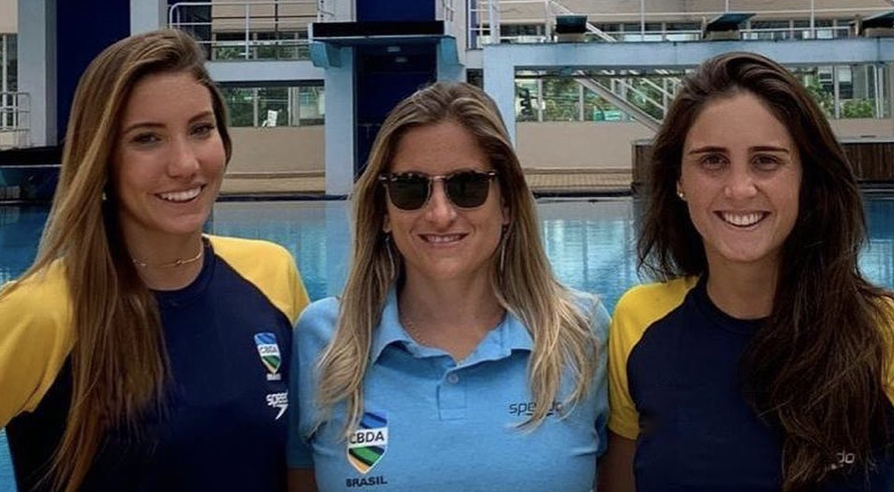
Nowadays, we are in Rio de Janeiro still trying to get back to normal, but we have to work within the Brazilian rules. We had never gone so long without training, not even on vacation. To get in shape was difficult after so much time out of the pool. In the beginning we had just a few hours for training. It gets increased as time passes.
During our time out of the water, we did physical preparation with the fitness coach three times a week, and worked on flexibility, abs, and land drilling every day. We also did video call with other countries. Every Friday, we had a workout session on Zoom with every team in the Americas. It was very interesting. There were exchanges of experiences, cultures and exercises. I added some of these exercises in our preparation now.
In my opinion, the worst of this year’s situation was staying out of the pool for a long time. The body missed it so much. But the best was that it increased our team unity. They helped each other even at a distance, mainly with good thoughts.”
Article by Christina Marmet
Cover photo by @natation_synchro_fc
If you’ve enjoyed our coverage, please consider donating to Inside Synchro! Any amount helps us run the site and travel costs to cover meets during the season.

